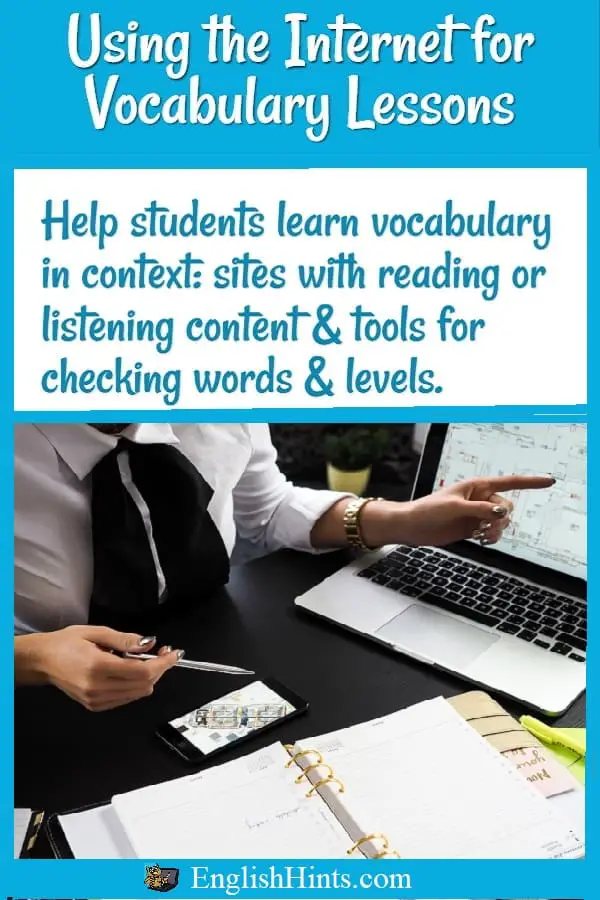Using the Internet for Vocabulary Lessons
When planning vocabulary lessons for intermediate or advanced level ESL students, don’t forget the authentic reading and listening resources available on the Internet.
A lot of research shows that most vocabulary is learned by repeated exposure (hearing or seeing a word multiple times in different contexts.)
The process can be accelerated in the classroom, but there is no substitute for students seeing and hearing the words in context—not just from a list of words they should learn.
Any good textbook will demonstrate and recycle the vocabulary the authors feel is most important. But what if you don’t have a textbook, or need to teach some words that aren’t emphasized in the books you have available?
The Internet is a great source of free reading materials for English-learners beyond the beginning levels. The problem, of course, is to find high-interest materials for your students at a level they can manage with your help.
Most of the interesting web pages I have found have been difficult even for advanced students. The ones mentioned below, while still not easy, should be possible for high intermediate or advanced classes—maybe even mixed levels if you have motivated students and provide good scaffolding.
Finding Vocabulary Materials Online
I’ve been looking for materials like that for ten or more years now, and would like to suggest some possible lessons. First a disclaimer: I haven’t used most of these materials in my own classrooms, for two reasons.
1. Most of these materials were not available when I was doing classroom teaching.
2. My classes were very mixed level, with a majority of high beginners.
When I started this website, I felt there was already a lot of good information available for ESL Beginners, but much less for English learners trying to transition from the ESL classroom to the academic or general English-speaking world. I’ve tried to fill that gap.
A large part of EnglishHints.com, and especially of its English Detective newsletter, is designed to help with that transition. The first 23 issues of English Detective offered readings and practice activities to teach the 570 words of the Academic Word List (AWL)—so important for students at English-speaking universities, or for professionals or business people who need to understand and communicate with English-speaking colleagues.
You might be able to use some of the reading and listening materials I've found, (as well as the AWL exercises based on them), for vocabulary lessons in an advanced level ESL class.
Tools & Sites for Vocabulary Lessons
· Input text into VocabProfile and it will give you alphabetical listings of its words that are in the first and second thousand words of the General Service List (the most common words), the Academic Word List, and off-list words (proper names and harder vocabulary, generally.) It also gives the percentage of each group. Ideally, only 5-10% of words excluding proper names would be unknown to your students.
· Flesch-Kincaid Reading Ease (with other measures of reading difficulty.)
· Voice of America Learning English (news and articles, audio and readings, some with limited vocabulary, read slowly)
· the BBC World Service (also news as well as articles, with audio as well as reading and sometimes with vocabulary and definitions at the end),
· English Online provides definitions of key words after the articles, as does BBC in some cases
· TED talks. I have used TED heavily in the suggestions for Vocabulary Lesson Plans, as students can both watch/listen (sometimes with subtitles if needed) and read a transcript (sometimes in their own language as well as English.) In addition, most of the speakers—on subjects of vital interest-- make a real effort to speak as clearly and simply as possible, with much less jargon than I have found in online newspapers or science magazines reporting the same information.
· On EnglishHints: Academic Vocabulary Word Lists. These four pages give the Academic Word List vocabulary introduced in each of the first 23 issues of English Detective. It includes the vocabulary in articles on different topics, newsletter by newsletter, as well as vocabulary practice (some interactive online, some text, and some pdfs) on each topic. The actual links to the readings are on the newsletter’s back issues page.
Often two or three newsletters
(with 4-8 reading or listening
selections and nearly as many practice activities) will look at different
aspects of one topic. You could pick the best reading and practice activities
for your needs to plan a lesson or even a unit. Topics include inventors
(Edison and Steve Jobs), science, the brain, medicine, the environment, poverty
and social change, American democracy, and various world affairs and cultural
issues.
See Vocabulary Lesson Plans for some ideas on how these materials could be used in a classroom.
Home> ESL Lesson Plans> Vocabulary Lessons.
Didn't find what you
needed? Explain what you want in the search box below.
(For example, cognates, past tense practice, or 'get along with.') Click to see the related pages on EnglishHints.
| site search by freefind | advanced |






